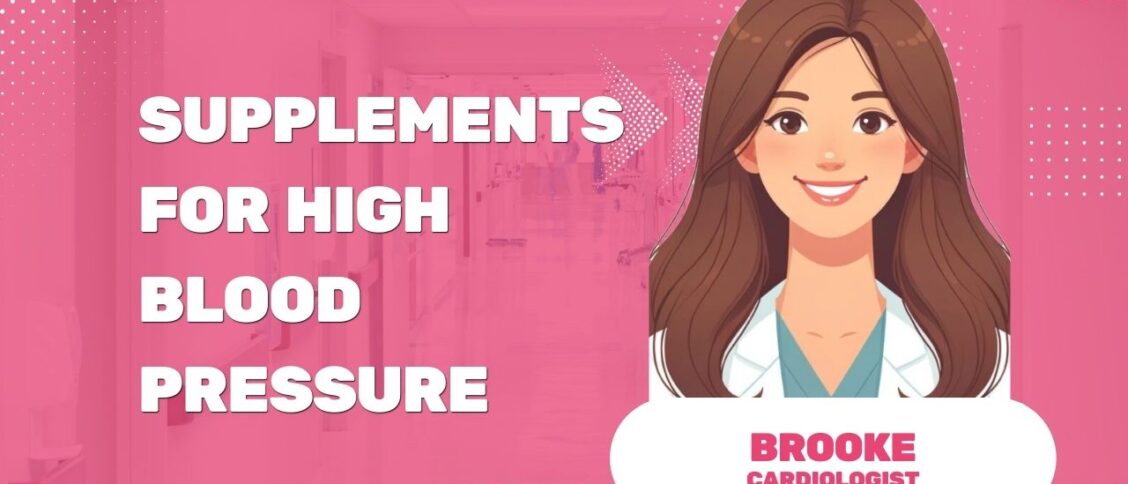High blood pressure, or hypertension, is a health concern that’s been knocking on our doors more frequently these days. It’s a silent killer that often goes unnoticed until it’s too late. With the right lifestyle changes, we can keep it at bay. One such change is the inclusion of certain supplements in our diet.
In this article, I’ll be exploring the world of supplements for high blood pressure. I’ll delve into the science behind how they work, their benefits, and how to incorporate them into your daily routine. It’s a treasure trove of information for anyone looking to combat high blood pressure naturally. So, let’s dive in and unlock the potential of these powerful, natural warriors.
Magnesium
When I consider Magnesium, it’s a crucial supplement in the arsenal against high blood pressure. It’s a natural calcium channel blocker—that’s scientist talk for a substance that relaxes blood vessels. When blood vessels relax, blood pressure reduces. It’s that simple!
Let’s try to understand the science behind magnesium’s role. Magnesium is involved in many body functions, including the control of blood glucose and blood pressure regulation. Examine the data below:
| Body Function | Role of Magnesium |
|---|---|
| Blood glucose control | Magnesium aids in carbohydrate metabolism, impacting insulin’s ability to manage blood sugar levels. |
| Blood pressure regulation | By working closely with calcium, this wonder mineral can help regulate your blood pressure levels. |
Regularly checking blood pressure is another essential step in tracking progress when incorporating magnesium supplements into your routine. So, why hesitate when you’ve got an accessible blood pressure monitor?
The question that arises usually is, “How much magnesium do I need?” The answer varies. According to the National Institutes of Health, dietary recommendations for magnesium range between 310 to 420 mg daily, based on an individual’s age and sex.
Here is the intake suggested by age group and sex:
| Age | Men | Women |
|---|---|---|
| 19-30 years | 400 mg | 310 mg |
| 31+ years | 420 mg | 320 mg |
Magnesium is readily available in food sources like leafy greens, nuts, and whole grains. But if you’re not meeting the required intake through your diet, you may want to consider magnesium supplements. It’s a non-invasive way of potentially lowering blood pressure.
However, keep in mind that abrupt and significant changes in magnesium can cause digestive side effects. Start small and work your way up.
While this critical mineral has multiple health benefits, it’s the potential to help regulate blood pressure ranges that make it a popular contender in natural ways to manage high blood pressure. When wisely paired with a healthy lifestyle, and regular monitoring, magnesium could be an influential player in your journey to a healthier blood pressure.
However, it’s not a solo act. Let’s move forward and discuss another effective supplement that can aid in managing blood pressure—the amazingly beneficial potassium.
Vitamin D
Swinging away from magnesium, let’s now focus on another powerful player on the blood pressure battlefield – Vitamin D.
As a fat-soluble vitamin, Vitamin D partakes in multiple key bodily functions. One perhaps surprising role is in maintaining healthy blood pressure. Research shows that Vitamin D can help in lowering blood pressure, predominantly in people with Vitamin D deficiency. The mechanism hiding behind this is still not well understood, but one plausible explanation is that Vitamin D might enhance the efficacy of the hormones responsible for regulating blood pressure.
Yet, another question arises – where can we find Vitamin D? Mainly, our bodies produce Vitamin D naturally when exposed to sunlight. However, sufficient amounts are tricky to obtain through diet alone. Food sources for Vitamin D include:
- Fatty fish, like salmon or mackerel
- Cheese
- Egg yolks
- Beef liver
Despite its availability, it’s challenging to get enough Vitamin D through food sources and sunlight alone. Hence, we often have to rely on supplementation. Also, it’s vital to remember that changes in dietary habits should not happen abruptly. Sudden escalation in Vitamin D intake may lead to potential side effects.
B vitamins
Moving our focus to B vitamins and understanding their role can offer more insight into maintaining a healthier blood pressure. B vitamins are an essential part of our diet and play a significant role in overall health.
To maintain healthy blood pressure levels, we need to prioritize B vitamins, particularly B6 and B12. High-quality research shows that these vitamins can assist in lowering blood pressure.
Studies have proven the efficacy of vitamin B6 in playing an essential role in reducing inflammation and helping with blood pressure regulation. Sufficient B6 levels are linked to a lower risk of heart disease as well.
Vitamin B12, on the other hand, aids in protecting the heart by removing a harmful protein substance named homocysteine from the blood. An excessive level of homocysteine can lead to arteriosclerosis, toughening and narrowing arteries, which ultimately elevate blood pressure.
Here’s a helpful table summarizing the roles of B vitamins in relation to blood pressure:
| Vitamin | Role |
|---|---|
| Vitamin B6 | Reduces inflammation, helps regulate blood pressure |
| Vitamin B12 | Removes homocysteine from the blood, protecting the heart and aiding blood pressure |
When it comes to checking blood pressure, you can use a blood pressure monitor to keep track of your readings regularly. Remember, blood pressure ranges need to be kept in check: systolic pressure should ideally be below 120, and diastolic pressure should be less than 80. Regular monitoring is crucial to stay informed and proactively manage high blood pressure.
It’s possible to get B vitamins through a balanced dietary intake. Foods rich in B vitamins include:
- Leafy green vegetables
- Whole grains
- Meat
- Eggs
- Dairy products
While incorporating such foods into your diet can improve vitamin B6 and B12 levels, in some cases, supplementation may be necessary. But, remember to consult your health practitioner before starting any new supplement regimen.
Now that we’ve explored the fundamental role of B vitamins, it’s clear that they are an essential piece of the blood pressure puzzle. So, let’s not stop here; exploring more supplements can add to our knowledge about managing blood pressure better.
Potassium
Continuing our exploration in the realm of supplements that could aid in lowering blood pressure, we stop next on potassium. It’s a powerhouse mineral, playing a vital role in our bodies, especially in blood pressure regulation.
Potassium works in direct relation to sodium — the mineral mostly responsible for triggering high blood pressure. It encourages the elimination of sodium from our bodies through urine, giving a balance that’s vital for maintaining a healthy blood pressure.
It’s important to know how much potassium to include in your diet. The American Heart Association (AHA) recommends an intake of about 4,700 milligrams(Mg) of Potassium daily. If that amount seems a little too abstract, don’t worry. Here’s a reference table showing some of the top high-potassium foods that can help you meet your daily quota.
| Food Item | Potassium Content (mg) |
|---|---|
| 1 medium-sized baked potato | 926 |
| 1 medium-sized banana | 422 |
| 1 Cup raw spinach | 167 |
| 1/2 Cup dried apricots | 755 |
While dietary changes and supplements can play a significant role in managing high blood pressure, it’s also crucial to maintain a healthy lifestyle. Regular exercise, ensuring you’re well-hydrated, reducing sodium intake, and eliminating stress, can make quite a difference.
Remember that while potassium is beneficial, too much could also be harmful, especially for those with kidney disorders. So it’s important to consult with your doctor before making any major changes to your potassium intake. In the realm of blood pressure, balance really is key.
CoQ10
Moving on from potassium, let’s explore yet another remarkable supplement that’s gaining traction in the high blood pressure realm: Coenzyme Q10 or, as it’s commonly known, CoQ10.
CoQ10 is a naturally occurring substance in our bodies, playing a significant role in energy production and providing an antioxidant effect. What excites me, and what should pique your interest, is that studies have indicated this coenzyme might help in lowering blood pressure.
One study published in the Journal of Human Hypertension demonstrated that a daily supplement of CoQ10, administered over 12 weeks, resulted in a considerable reduction in systolic blood pressure. Isn’t that intriguing?
But, before you start adding CoQ10 to your cart, let’s delve a little deeper. Exactly how does CoQ10 help in managing blood pressure?
How Does CoQ10 Work?
CoQ10 is believed to enhance the heart’s muscle cells, optimise cardiac function, which is directly linked to blood pressure. Moreover, its antioxidant properties help in neutralising free radicals, aiding overall cardiovascular health.
Just as a healthy diet matters, regular use of a blood pressure monitor is invaluable for people suffering from hypertension. Tracking the changes in your blood pressure can help assess the effectiveness of CoQ10 — or any other supplement for that matter.
- CoQ10 isn’t regulated by the Food and Drug Administration (FDA), so the quality and dosages may vary from product to product.
- Consult your doctor before starting on CoQ10, especially if you’re on medication for any chronic health condition.
- Some people may experience mild side effects such as
L-arginine
Moving forward from the discussion on the antioxidant powerhouse CoQ10, let’s shift our focus onto another supplement known as L-arginine. This is an amino acid that plays a critical part in many bodily functions. It’s especially relevant when we are checking blood pressure on our blood pressure monitors because of its impact on our cardiovascular health.
L-arginine is naturally produced in our bodies, and we also get some from the foods we eat. It plays a key part in producing nitric oxide. You might be wondering, why is nitric oxide significant? Well, it’s due to its capacity to relax or widen your blood vessels. This effect can directly contribute to lowering blood pressure.
There have been studies that show the use of L-arginine supplements can potentially help in managing blood pressure. One particular research conducted in 2011 showed a decrease in systolic as well as diastolic blood pressure after patients were given 4 grams of the supplement.
| Study results | Blood pressure reduction |
|---|---|
| Systolic Blood Pressure | -5.39 mm Hg |
| Diastolic Blood Pressure | -2.66 mm Hg |
These findings revealed that L-arginine had a mild to moderate effect. Consequently, it’s important to remember that the influence of L-arginine could vary based on individual health conditions, overall lifestyle, diet, and current medication.
L-arginine can be naturally included in your diet by adding foods rich in this amino acid. Those are:
- Red meat
- Poultry
- Fish
- Dairy products
However, if you’re considering using L-arginine as a supplement to manage your blood pressure better, bear in mind to always consult a healthcare professional before starting any new medication. They can guide you on how to complement the supplement usage with a healthy lifestyle, taking into consideration your specific health condition.
So, as we continue to understand blood pressure ranges, ensure to include this amino acid in your health monitoring regime. Remember that knowledge and understanding of these supplements is an essential tool in the management of high blood pressure. Keep checking your blood pressure regularly and continue towards maintaining a balanced lifestyle.
Vitamin C
If we delve deeper into the pool of supplements for high blood pressure, we can’t overlook the potential benefits of Vitamin C. This nutrient, known for its efficacy in boosting the immune system, also holds immense promise when it comes to managing blood pressure.
Studies have surfaced suggesting a correlation between Vitamin C intake and lower blood pressure. It’s said that having adequate amounts of this vitamin in your diet might have a beneficial effect on both systolic and diastolic blood pressure readings.
A study conducted on hypertensive and normotensive subjects revealed some enlightening data. Over the 8-week period, subjects who consumed 500 mg of Vitamin C daily saw their systolic blood pressure drop by an average of 3.84 mmHg and diastolic pressure by 1.48 mmHg.
| Systolic Reduction | Diastolic Reduction | |
|---|---|---|
| Vitamin C (500 mg) | 3.84 mmHg | 1.48 mmHg |
But taking supplements alone won’t render the desired outcomes. Maintaining a balanced diet rich in Vitamin C and regularly monitoring your blood pressure is essential. Blood pressure ranges can fluctuate throughout the day. A blood pressure monitor could be a handy tool for keeping a tab on these readings. Also, including fruits and vegetables like oranges, strawberries, bell peppers, and kale in your diet will naturally increase your Vitamin C intake.
While we’re talking about this, it’s important to note that excessive Vitamin C can lead to diarrhoea and nausea. Always consult a healthcare professional before introducing any major changes to your diet or supplement routine.
Keep in mind that these supplements are not a cure but aides that can potentially help lower blood pressure. They should be seen as part of a lifestyle strategy, which should include regular exercise, a healthy diet, and regular health check ups.
Beetroot
Let’s take a closer look at one of the nature’s most powerful weapons in the fight against high blood pressure: the humble beetroot. It’s crimson hue is more than just a pretty color, it also signals the presence of health-promoting compounds that are beneficial for maintaining healthy blood pressure levels.
It’s noteworthy that consuming beetroot in juice form has become increasingly popular due to the discovery of its potential health benefits, particularly in lowering blood pressure.
Known scientifically as Beta vulgaris, beetroot contains appreciable amounts of dietary nitrates, a type of compound that can help to relax and dilate blood vessels, hence promoting healthy blood flow. This process can assist in lowering high blood pressure, as well as reducing the risk of cardiovascular diseases.
| BEETROOT COMPOSITION | |
|---|---|
| Dietary Nitrates | High |
| Antioxidants | High |
| Anti-inflammatory Compounds | Present |
| Vitamin C | Moderate |
Most of the dietary nitrates in beetroot convert into nitric oxide in the body. Nitric oxide, interestingly, is a vasodilator that broadens blood vessels hence facilitating smooth blood flow. This biological cascade effectively lowers blood pressure.
Drinking beetroot juice, or incorporating the vegetable in a wholesome diet could offer promising results in terms of managing blood pressure.
However, always remember, checking blood pressure regularly is essential when dealing with hypertensive conditions. Thankfully, there are numerous reliable blood pressure monitors available today that can help you keep track of changes.
Below are several ways to enjoy beetroot for blood pressure management:
- In juice form or smoothies: Freshly squeezed or blended beetroot juice is one of the fastest ways to avail its benefits.
- In salads: Grated raw beetroot pairs well with most salads.
- As a warm side dish: Roasted beetroot, anyone?
While more research is needed to determine the optimal dosage and methods of preparation, preliminary studies and traditional use point to the potential of beetroot in the management of blood pressure.
The discussion about beetroot is vital because blood pressure ranges fall into various categories, and it’s important to aim for a healthy range. Here’s a brief blood pressure chart for reference:
Garlic
Moving forward, another particular supplement that’s captured my interest for its blood pressure-lowering capabilities is garlic. Often recognized for its prominent place in culinary dishes, garlic also boasts numerous health benefits.
For centuries, garlic has been embraced traditionally as a healing aid. It’s a versatile flavor enhancer that’s also been known to have some striking medicinal properties, and one of those is its potential to impact blood pressure ranges.
What gives this unassuming little bulb its potent hypertension-fighting capabilities? It’s mainly due to its unique sulfur-containing compounds, particularly allicin. Studies indicate this compound helps relax and dilate blood vessels, much like nitric oxide does, thereby aiding in lowering blood pressure.
Garlic can be consumed in many ways to leverage these health benefits. Consumed freshly chopped or crushed allows better bioavailability of its nutrients – notably allicin. A more favorited way, however, is through garlic supplements. This way, it bypasses the culinary sphere and heads straight to the medicinal.
The advantage of supplements over the raw form is in its standardized doses. Maintaining a consistent dose can be tricky with raw or cooked garlic due to variations in allicin content. Garlic supplements, generally in the form of pills, come with premeasured amounts, ensuring you get the desired dose.
Although garlic reasons to be a viable natural supplement, checking blood pressure is still an essential part of managing hypertension. This can be conveniently done using a blood pressure monitor. The readings give you an idea of where you stand in the blood pressure chart and how much further you need to go.
As always, it’s important to keep in mind that while supplements like garlic can help, they shouldn’t be seen as the ‘be-all, end-all’ solution. A balanced diet, regular exercise, and routine check-ups should still firmly stay in your hypertension management plan. That being said, the road to healthier blood pressure might just run through your kitchen’s spice rack or your local health food store’s supplement aisle.
Progressing on from garlic, another kitchen staple comes to mind that surprisingly showcases promising results in managing high blood pressure. Next on our radar is flaxseed and its intriguing impact on blood pressure levels.
Fish oil
As we consider other supplements that can make a significant contribution to controlling high blood pressure, let’s delve into the potential of fish oil. Enriched with Omega-3 fatty acids, fish oil is known to offer numerous health benefits, including the capacity to help maintain healthy blood pressure ranges.
Omega-3 fatty acids consist of EPA (eicosapentaenoic acid) and DHA (docosahexaenoic acid). These compounds play a crucial role in our body. One of their primary functions is reducing inflammation, which is a key contributor to high blood pressure.
Studies suggest that consistent consumption of fish oil can help lower blood pressure, particularly in individuals suffering from hypertension. To illustrate, let’s look at some data:
| Studies | Reduction in Systolic Blood Pressure | Reduction in Diastolic Blood Pressure |
|---|---|---|
| Study 1 | 4.51 mm Hg | 3.05 mm Hg |
| Study 2 | 3.85 mm Hg | 2.49 mm Hg |
| Study 3 | 2.67 mm Hg | 1.94 mm Hg |
These studies essentially showcase the potential fish oil has in lowering blood pressure.
In addition to supplements, it’s also possible to increase your Omega-3 levels by incorporating fish into your diet. Some of the high Omega-3 options include:
- Mackerel
- Salmon
- Sardines
- Tuna
- Trout
By incorporating these fish into your diet, you’re effectively boosting your Omega-3 intake, which aids in maintaining balanced blood pressure. Furthermore, having a blood pressure monitor handy would help keeping track of your progress.
Remember, it’s imperative to check with your healthcare provider before starting any supplement regimen. This includes fish oil. They can guide you on the appropriate dosage, particularly if you’re on medications that might interact with the Omega-3 fatty acids.
As always, supplements should be a part of a balanced lifestyle that includes a healthy diet, regular exercise, and consistent blood pressure checks. This combination is the key to achieving and maintaining optimal blood pressure levels. Fish oil may not be the magic bullet, but it’s a potentially powerful tool in the fight against high blood pressure.
Probiotics
Continuing on our exploration of supplements, let’s delve into the wonderful world of Probiotics. These powerful little bacteria can offer a plethora of health benefits including, among others, the potential to lower blood pressure.
We’ve become increasingly aware of the connection between our gut health and several aspects of our overall wellness. Among gut-friendly options for boosting health, probiotics are topping the charts. They’ve been a hot topic in the wellness industry for a few years now, especially when it comes to improving our digestion or battling bloat. But an often-overlooked advantage of probiotics is their potential role in controlling blood pressure.
Probiotics, naturally occurring in foods like yogurt and sauerkraut, can also be taken as a supplement. Lactobacillus and Bifidobacterium are two common strains found in probiotic supplements that are linked to blood pressure benefits. Studies suggest these particular probiotics may help reduce systolic and diastolic blood pressure in people with hypertension.
Sure, you could take a stab at guessing the right probiotic strain and dosage to take, but where’s the fun in that? Just as not all probiotics are created equal, not all will have the same effects on your blood pressure. Here’s a suggestion: book an appointment with your trusted healthcare provider. They’ll guide you in the right direction, ensuring you’re checking your blood pressure regularly and using a reliable blood pressure monitor. Then, armed with your personal data, they can advise you on the most effective probiotics for your individual needs.
Incorporating more probiotics into your diet doesn’t have to mean just popping a pill either. Lots of foods are teeming with beneficial bacteria. Including these foods in your daily meal plan can assist in lowering your blood pressure. Yogurt, sauerkraut, kimchi, miso – these might not be your typical dietary staples, but they may well offer a tasty avenue towards better health.
Remember, no supplement, including probiotics, should be viewed as a substitute for a balanced diet, regular exercise, and routine medical check-ups. Each plays its part in a holistic, healthy lifestyle. As we transition to the following section, we’ll put our focus on nutritional ways to manage your hypertension.
Melatonin
In the quest for supplements that aid in reducing high blood pressure, Melatonin is garnering attention. Known mostly for its role in managing sleep cycles, recent research suggests melatonin has potential benefits regarding blood pressure stabilization.
Melatonin, typically secreted by the pineal gland in the brain, helps regulate your body’s internal clock — also known as your circadian rhythm. Interestingly, there’s a distinct correlation between our circadian rhythms and blood pressure patterns. Our blood pressure naturally dips overnight while we’re sleeping, only to rise again in the morning. So, it’s not too surprising that a supplement influencing sleep patterns might also have an effect on blood pressure.
According to studies, melatonin may assist in synchronizing disrupted sleep-wake cycles, which in turn can help regulate blood pressure. Regular consumption of a low dose, typically around 2 milligrams, prior to bedtime, has shown modest reductions in night-time systolic blood pressure.
However, keep in mind, Melatonin is not a standalone solution. It is just one part of a comprehensive approach to lowering blood pressure. Let’s dig deeper into this.
Melatonin’s Potential Role in Lowering Blood Pressure
First things first, it’s essential to understand that using melatonin for blood pressure regulation isn’t a well-worn path. Scientific studies have given us some insight but these promising results need more supportive evidence.
A 2011 study published in the Journal of Pineal Research suggested that slow-release melatonin can lower night-time blood pressure in men. Additionally, studies involving heart disease patients have shown that around 3mg of melatonin before bed can lower systolic blood pressure significantly.
However, there are some aspects to consider before incorporating melatonin into a blood pressure strategy:
- Melatonin interacts with a variety of medications, including blood pressure drugs.
- The overall effect of melatonin on blood pressure could vary between individuals.
- Consumption of melatonin needs to be carefully timed.
Despite these factors, melatonin seems to have potential and adds another layer to a blood pressure management strategy.
It’s always important to track your progress while implementing a new strategy and take regular readings. Having a blood pressure monitor at home can help in tracking the fluctuations. A blood pressure chart showing variations across days and weeks will provide a clear picture and help measure the efficacy of the added supplement.
Green tea
As I glide through the extensive list of supplements beneficial in managing high blood pressure, Green tea captures our interest next. Renowned for its widespread consumption globally, this traditional drink might be more than a comforting beverage for many.
The enticing benefits of green tea go way beyond refreshing mornings. Chock full of antioxidants, particularly a specific type called flavonoids, it has often been tapped for its potential to lower blood pressure.
Intriguing preliminary research shows that leveraging the power of green tea effectively could result in healthier blood pressure ranges. A study indicates that individuals consuming 3-4 cups of green tea daily had a significant reduction in their blood pressure levels. However, the extent to which green tea can impact blood pressure could vary depending on several factors, including an individual’s overall dietary intake, lifestyle, and physical activity levels.
| Green Tea Consumption | Potential Result |
|---|---|
| 3-4 cups daily | Significant reduction in blood pressure |
Just like melatonin, it’s crucial to remember that green tea shouldn’t be viewed as a standalone solution to high blood pressure. Instead, consider it a part of a larger, comprehensive approach encompassing a balanced diet, regular exercise, and prescribed medication (if required). Furthermore, monitoring your blood pressure regularly with a blood pressure monitor could effectively track your progress.
Despite its enticing potential, there’s a caveat. For some, green tea could lead to adverse effects, especially when consumed excessively. Side effects can range from mild irritations such as stomach upset to more serious issues like liver damage.
Before making green tea a staple in your blood pressure management regime, here are a couple of recommended steps:
- Checking blood pressure: Keeping a track of your blood pressure before, during, and after introducing green tea to your diet could paint a clearer picture of its effects on you. A blood pressure chart could prove especially handy for this.
- Consulting a healthcare professional: A healthcare expert or a trained dietitian should be able to provide a more tailored approach to incorporating green tea into your lifestyle.
So, while sipping on that cup of green tea, you’re potentially bettering your health. It’s best to use this information to harness the full potential of this amazing beverage and make it a meaningful part of your blood pressure management strategy. Let’s continue the journey with other potential supplements in the coming sections.
Ginger
Ginger is another supplement I’d like to highlight that could potentially aid in lowering blood pressure. A common component in cooking due to its powerful flavor and health benefits, ginger has been a staple in natural medicine for centuries.
Ginger And Blood Pressure
Research into ginger’s impact on blood pressure is still ongoing, but findings so far have been positive. A study published in the International Journal of Cardiology found that among participants with hypertension, those who consumed a daily dose of ginger significantly reduced their blood pressure.
| Group | Blood Pressure Before | Blood Pressure After |
|---|---|---|
| Ginger | 140/90 mm Hg | 130/85 mm Hg |
| Control | 140/90 mm Hg | 140/90 mm Hg |
These findings show a promising trend but keep in mind everyone reacts differently to natural supplements.
Ginger’s Role in Heart Health
Its heart health benefits don’t stop there. Ginger also contains compounds that can help reduce blood clotting, lower cholesterol, and regulate blood sugar—all factors that may indirectly aid in maintaining healthy blood pressure ranges.
Incorporating Ginger Into Your Daily Life
Adding ginger to your lifestyle doesn’t require drastic changes. Here are a few ways:
- Brew it into a hot tea
- Use it in cooking, particularly in stir-fries and curries
- Add it to smoothies or juice
- Take it as a supplement in capsule form
Remember
Before incorporating any supplement, including ginger, into your routine, always consult a healthcare professional to avoid unintended side effects or interactions with other medications. For instance, if you’re taking a blood thinner, consuming high amounts of ginger could be risky as it might further decrease your blood clotting ability.
Incorporating regular checks is key in managing any changes in blood pressure. Investing in a blood pressure monitor could be an excellent move. This gives you the freedom to check your levels without the need for frequent doctor visits.
So, while it’s not a standalone solution, adding a bit of ginger might turn out to be a tangy step towards achieving and maintaining healthier blood pressure. The quest for natural alternatives to support blood pressure continues—let’s explore the benefits of garlic in the next section.
Calcium
New on our list is calcium. As we’ve previously discussed, several supplements can aid in maintaining balance in our blood pressure. Let’s delve a bit deeper, shall we?
What Supplements You Should Avoid When You Have High Blood Pressure?
Certain supplements can disrupt the normal functioning of your blood pressure; hence, their consumption should either be limited or avoided. I’m going to touch briefly on these potential foes.
Arnica
Arnica is known for its applications in pain management, but it’s best to keep it off the plate for those with hypertension.
Ephedra
Ephedra, commonly used in weight loss supplements, can spike up your blood pressure and heart rate.
Gingko
Though Gingko improves cognitive functions, it’s not advisable due to its blood thinning effect.
Ginseng
Ginseng could benefit you in myriad ways, but it’s been noted to interfere with blood pressure regulation.
Guarana
Though popular in energy drinks, Guarana can significantly heighten blood pressure levels.
Licorice
Licorice, despite its sweet nature, can cause heart palpitations and high blood pressure.
Senna
Senna is a go-to for bowel issues but maybe not an ideal choice for those with high blood pressure.
St. John’s Wort, Yohimbine, Bitter Orange, Dong Quia
St. John’s Wort, Yohimbine, Bitter Orange and Dong Quia form the final combination, all of which may potentially impact blood pressure.
Now let’s move swiftly to our next critical point – potential interactions between these supplements and your medication.
What Supplements May Interact with Blood Pressure Medications?
Medication plays a vital role in managing blood pressure levels. Therefore, it’s important to know any potential interactions between your meds and various supplements.
St. John’s Wort
St. John’s Wort is known to decrease the effectiveness of certain drugs.
Warfarin
Warfarin and some supplements could form an unhealthy mix leading to mysterious bruising or bleeding.
Calcium Channel Blockers, Statins
Both Calcium channel blockers and statins may have heightened or reduced effects if combined with certain supplements.
Antidepressants, Birth Control Pills
Antidepressants and birth control pills have been reported to react differently when taken alongside some supplements, so keep an eye out.
Cyclosporine, Blood Thinners
Lastly, we have cyclosporine and blood thinners which could disturb the balance of your system when mixed with certain supplements.
Your blood pressure monitor might be a handy sidekick in this journey, continuously checking your progress and steering you clear of any health roadblocks. It’s also essential to consult your healthcare professional regularly to avoid unnecessary complications. Reading the fine print and maintaining a well-balanced lifestyle is the best strategy for your journey towards healthy blood pressure ranges.
Is it OK to take multivitamins with high blood pressure?
Yes, taking multivitamins can be safe for individuals with high blood pressure, provided they contain safe-to-consume elements. After all, various vitamins and minerals can assist in managing blood pressure levels. It’s key, though, to keep one thing in mind always: when dealing with high blood pressure, it’s vital to consult your healthcare provider before adding any new supplements, even multivitamins, to your regimen.
Vitamins Beneficial for High Blood Pressure
Some multivitamins contain elements that can potentially help in lowering blood pressure and maintaining heart health.
- Magnesium: Known to relax the arteries, aiding in the reduction of blood pressure.
- Vitamin B6 and B12: Help the body get rid of homocysteine, an amino acid linked to heart disease.
- Vitamin D: Studies suggest a link between a deficiency of this vitamin and high blood pressure.
| Vitamins | Action |
|---|---|
| Magnesium | Relaxes arteries |
| Vitamins B6 & B12 | Lower homocysteine |
| Vitamin D | Prevents deficiency linked to high blood pressure |
Consult your healthcare professional about introducing these vitamins into your diet as everyone has unique health needs. It’s an important step in safely avoid the risk of disrupting your blood pressure regulation when starting on supplements.
Checking the Components
When you’re checking out multivitamin labels, it’s vital to avoid those containing herbs and elements we’ve previously mentioned that may increase your blood pressure. Remember, certain supplements like arnica, ephedra, ginkgo, senna, and others are known to disrupt blood pressure levels.
Taking the wrong multivitamin unknowingly could upset your blood pressure control efforts, so always scan the labels. This step, along with using your blood pressure monitor for regular checks, will ensure you maintain healthy blood pressure ranges.
Monitoring High Blood Pressure
Using a blood pressure monitor, it’s advisable to keep consistent records of your blood pressure ranges. With the fluctuating nature of blood pressure, it’s crucial to keep track and notice any possible reactions you might have to new supplements or medications. A regular blood pressure chart will be invaluable here.
How to choose the right blood pressure supplement?
It’s no secret that maintaining healthy blood pressure is vital for overall well-being. Including certain supplements in your regimen can contribute towards this goal. However, it’s crucial to approach these supplements with knowledge and caution. Here we will unravel the details about picking the right blood pressure supplement for you.
What Herbal Supplement Do We Recommend?
Without doubt, Hawthorn is a herbal supplement that earns our nod of recommendation. Used for centuries in traditional medicine, hawthorn is known for its heart-helping benefits. Packed with antioxidants, this wonder herb helps widen blood vessels and improve blood flow, subsequently lowering blood pressure.
Is it Safe to Use Over the Counter Blood Pressure Supplements?
While noteworthy, it’s important to remember that ‘over the counter’ does not always equate to safety. Although these supplements are easily accessible, determining their safety is not as straightforward.
Some over the counter blood pressure supplements can interact with medication, leading to adverse side effects. Price and brand name don’t always vouch for effectiveness or safety. Therefore, checking labels, being mindful of questionable “proprietary blends”, and consulting your healthcare provider is essential before starting any new supplement regimen.
Can Herbal Supplements Replace a Blood Pressure Medication?
Interest in natural treatments is ever increasing. However, let’s clear a crucial fact – Herbal supplements are not replacement for prescribed medication. They can complement prescribed medication, but should not be considered as standalone treatment for high blood pressure. Consulting your doctor before making any major alterations to your treatment plan is crucial.
What Are the Best Alternatives to Blood Pressure Supplements?
Maybe supplements aren’t for you. Worry not, we’ve got you covered. Altering dietary and lifestyle habits can be powerful tools in keeping your blood pressure in check. Here are some proven non-supplement alternatives:
- Monitoring and reducing sodium intake
- Regular physical activity
- Maintaining a healthy body weight
- Healthy and balanced diet rich in fruits, vegetables, lean protein and whole grains
- Limiting alcohol and quitting smoking
Remember, a blood pressure chart can be a great tool to keep a timely tab on your blood pressure ranges. While a blood pressure monitor can facilitate regular checking of your blood pressure levels at the comfort of your home.
To wrap, the road to lowering blood pressure doesn’t have to be laden with uncertainties. With sound knowledge and mindful choices, your journey to healthier blood pressure levels can be smoother and more empowering.
How to take blood pressure at home?
Knowing how to check your blood pressure at home is an important part of managing high blood pressure. It’s vital to stay familiar with your blood pressure ranges and understand the importance of maintaining healthy levels.
Why You Should Buy a Blood Pressure Monitor?
A blood pressure monitor isn’t just a handy tool for those with a diagnosis of high blood pressure. It’s a vital instrument for anyone wanting to proactively manage their health. It can help in the following ways:
- Recognizing patterns: Monitoring your blood pressure at different times of the day can help identify patterns or spikes. It also allows you to see if your lifestyle changes or supplements are helping in lowering blood pressure levels.
- Gives a better long-term picture: Occasional readings at doctor’s visits give a snapshot, but regular monitoring at home shows the whole film of your blood pressure health.
- Effective dialogues with doctors: Regular readings provide real-world data that you can share with your healthcare provider. This leads to more informed discussions and better healthcare outcomes.
What Blood Pressure Monitors Are Most Accurate?
Several home blood pressure monitors on the market are reliable and straightforward to use. Here are some top picks:
- Omron Platinum Blood Pressure Monitor
- GreaterGoods Bluetooth Blood Pressure Monitor
- Withings BPM Connect – Smart Blood Pressure Monitor
Keep in mind, irrespective of the brand you choose, make sure to get your device regularly calibrated for accuracy. Also, ensure you are checking your blood pressure correctly. Sit calmly, keep your arm at heart level, don’t talk during the test, and take a reading at the same time each day.
Final words
It’s clear that supplements can play a role in managing high blood pressure. But remember, they’re not a magic bullet. They should be part of a comprehensive approach that includes a healthy diet, regular exercise, and ongoing monitoring of your blood pressure. Hawthorn is a promising herbal supplement, but don’t forget to consult your healthcare provider before starting any new regimen. It’s crucial to check labels, especially on multivitamins, to avoid ingredients that may spike your blood pressure. Over-the-counter doesn’t always mean safe. And while supplements can help, they’re not a substitute for prescribed medication. Lastly, investing in a reliable blood pressure monitor and knowing how to use it correctly can be a game-changer in your health journey. Stay proactive, stay informed, and stay healthy.







